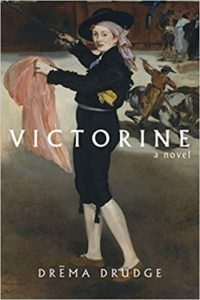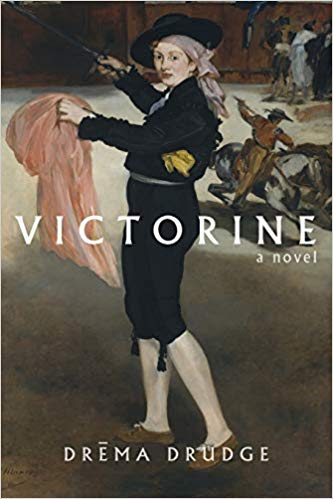 Victorine Meurent is born in Paris, a city that is itself a work of art. Haussmann is pushing out the poor to create broad avenues and elegant sandstone apartment buildings. The new department stores provide the clothing, cosmetics, and jewelry that allow—or oblige—every woman to look beautiful. How could Victorine have grown up without an eye for beauty?
Victorine Meurent is born in Paris, a city that is itself a work of art. Haussmann is pushing out the poor to create broad avenues and elegant sandstone apartment buildings. The new department stores provide the clothing, cosmetics, and jewelry that allow—or oblige—every woman to look beautiful. How could Victorine have grown up without an eye for beauty?
Her parents are almost-artists, a milliner and a lithographer who prints posters that paper the city. They discourage their daughter’s pursuit of art, which requires expensive art school training and supplies. But Victorine won’t settle for painting china or making hats.
Tiny sips of beauty ruin the deeper thirst for art, she says. Pretty cups and
cheerful hats are made to mollify women.
Instead, Victorine turns to modeling, first for art classes, then for Edouard Manet. During her years of modeling for Manet, she absorbs his painting techniques and, in turn, challenges his perceptions of women. The pair grow to understand and admire one another as a result of their collaboration.
But when Victorine models for the scandalous paintings Luncheon on the Grass and Olympia, she finds herself vilified. Paris turns on her. Only when she begins to model for Alfred Stevens, a most un-scandalous artist who makes her the subject of his pretty paintings, is her reputation repaired.
Throughout, Victorine insists on her selfhood. She lives a reckless life and answers to no one. She will be who she is, no matter what the price. And most of all, what she wants to be is an artist, to “capture something of now for later.”
After years of modeling, Victorine has enough money to pay for art school, where she excels. Later, she’s able to support herself through portraiture. It is her self-portrait that is accepted by the prestigious Salon held by the Academy des Beaux Arts. With it, Victorine feels that the student has surpassed the master; she sees her self-portrait as superior to many of Manet’s works. She will leave a legacy.
Drudge writes the novel from a deep first-person point of view, in present tense. The reader is in Victorine’s head, privy to her opinions, insights, and delicious descriptions of Manet’s and Stevens’ paintings, following her moment by moment through both process and result.
For someone like me, familiar with the women artists of the time (my novel La Luministe, is about Impressionist Berthe Morisot), a special delight in this novel is the author’s imagining of Victorine’s friendship with Eva Gonzalès, a student of Manet’s who exhibited with the Impressionists. It’s intriguing to think of how these two seemingly very different women might have interacted.
If you want to read about a renegade heroine, a fresh point of view about the Parisian art world, a book about beauty, beautifully written, find Drēma Drudge’s remarkable debut novel, Victorine.
